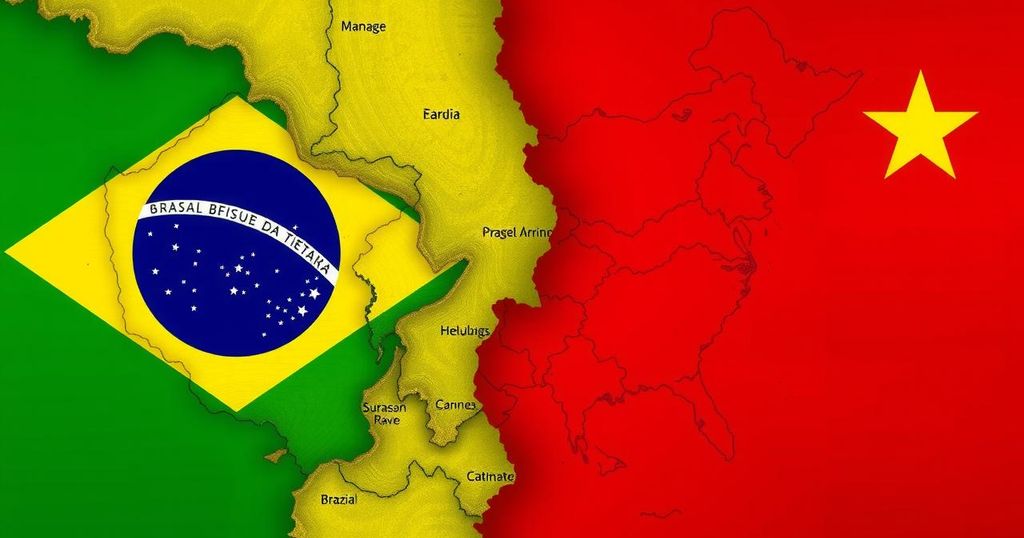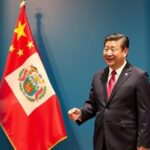Fostering Brazil-China Relations: A 50-Year Journey of Trade and Collaboration
Brazil and China are celebrating 50 years of fruitful bilateral relations marked by significant economic collaboration, highlighted by a record $105 billion in trade in 2023. Key sectors of cooperation include agriculture, energy, and technology, with ongoing investments shaping the future of their partnership. The recent visit of Chinese President Xi Jinping to Brazil is pivotal as the nation prepares to host global initiatives, presenting further opportunities for cooperation in sustainable development and economic governance.
The enduring partnership between Brazil and China, established over five decades, is characterized by mutual respect and collaboration leading to significant economic integration. Recent statistics highlight a record bilateral trade of $105 billion in 2023, a testament to the strengthened trust and strategic cooperation between the two nations. Both economies exhibit critical complementarity reflected in sectors such as agriculture, energy, and technology, with Chinese investments playing a vital role in Brazil’s industrial and technological progress. The Brazilian Center for International Relations (CEBRI) has reported a sharp increase in high-level exchanges, focusing on innovative cooperation in technology and sustainability. The multifaceted relationship extends beyond trade to significant collaborations in areas including space science, renewable energy, and digital transformation. Brazil’s need for infrastructure investment, currently lagging at 1 percent of GDP—well below the necessary 3 to 4 percent—offers a pivotal opportunity for both nations, particularly through initiatives like the Belt and Road Initiative. Brazil is aiming to diversify its export portfolio, with notable advancements such as the export qualification of 38 meatpacking plants to China. Efforts are underway to enhance the export of higher value-added products. Additionally, Brazil and China share aligned interests in multilateral platforms regarding sustainable development and global governance reforms, demonstrating the maturity of their diplomatic ties. The ongoing visit by Chinese President Xi Jinping to Brazil is significant as both nations commemorate 50 years of bilateral relations while Brazil prepares to host global summits including the G20 and UN Climate Change Conference. This alignment of agendas presents an opportunity for Brazil to assert its leadership in sustainable practices and environmental innovation, resonating with China’s interests in robust agricultural and technological partnerships. The role of the Brazil-China partnership is increasingly recognized in fostering global initiatives focused on environmental protection and poverty alleviation. A collaborative strategy that capitalizes on each country’s strengths could lead to substantial advancements in various sectors, reinforcing the bilateral relationship amid global economic challenges. The emphasis on pragmatic yet bold approaches is critical for realizing the full potential of this partnership, promising benefits for both nations in their international engagements.
The Brazil-China relationship celebrates its 50th anniversary in 2024, marked by extensive bilateral trade and strategic investments that enhance economic ties. Brazil has become a key partner for China in various sectors, notably agriculture and technology, with China’s investments contributing to Brazil’s development. The Brazilian government is now focused on improving infrastructure and diversifying its exports, seeking more substantial collaboration with China to increase competitiveness and value addition in trade. These dynamics have arisen amid significant multilateral cooperation efforts, particularly in sustainability and addressing global governance challenges.
In conclusion, the Brazil-China relationship, underpinned by mutual respect and strategic engagement over 50 years, has the potential for further development through targeted investments and diversification of trade. As both countries seek to leverage their economic complementarity, the upcoming high-profile summits and cooperative initiatives present a unique opportunity to advance their shared vision for sustainable development and elevate their global presence.
Original Source: www.cnhinews.com








Post Comment